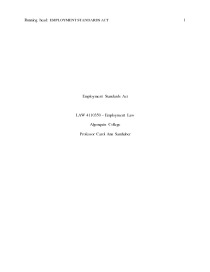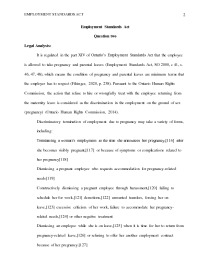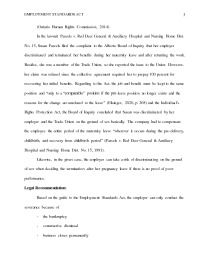Running Head: Employment Standards Act



Running head Employment Standards Act. Employment Standards Act. LAW 4110350 – Employment Law. Question two. Legal Analysis. Legal Recommendation. References.
It is stated in the Ontario’s Employment Standards Act that the regulation for timing of vacation as follows:
35 The employer shall determine when an employee shall take vacation for a vacation entitlement year, subject to the following rules:
1. The vacation must be completed no later than 10 months after the end of the vacation entitlement year for which it is given (…)
(Employment Standards Act, 2000, SO 2000, c 41, s 35)
And:
35.1 (2) The employer shall determine when the employee shall take his or her vacation for the stub period, subject to the following rules:
1. The vacation shall be completed no later than 10 months after the start of the first alternative vacation entitlement year.
2. Subject to paragraphs 3 and 4, if the vacation entitlement is equal to two or more days, the vacation shall be taken in a period of consecutive days.
3. Subject to paragraph 4, if the vacation entitlement is equal to more than five days, at least five vacation days shall be taken in a period of consecutive days and the remaining vacation days may be taken in a separate period of consecutive days.
4. Paragraphs 2 and 3 do not apply if the employee requests in writing that the vacation be taken in shorter periods and the employer agrees to that request
(Employment Standards Act, 2000, SO 2000, c 41, s 35.1,2).
Theoretically, the employer will determine when their staff can take the vacation as if the duration and payment of vacation meet the right to vacation mentioned in Part XI of the Employment Standards Act, 2000, SO 2000. If the employee would like to take the vacation as the time they wish or shorten their vacation, they can discuss with their employer. Additionally, any further expectation in terms of vacation duration or payment need to be discussed and approved by the employer. As an illustration between the Ontario Public Service Employees Union and Muskoka Algonquin Healthcare, the company was complaint by the Union in terms of the vacation period and the practice of calculating vacation credit, on the behalf of a group of employees, that the full-time employee from one-year service should be entitled the vacation entitlement higher than the accrual basis and established it in the Collective Agreement when the employee reach the milestone year of service (Ontario Public Service Employees Union, Local 380 v Muskoka Algonquin Healthcare, 2019). Nevertheless, based on the local contract (article nineteen with regard to distribution of vacation entitlement, it is mentioned that “vacation requests will be made, approved and based on the employee’s home site”. Considering the fact that the employer fulfilled in properly delivering vacation duration and entitlement to employees in the comparison to the Act and also the local agreement, the arbitrator decided that the grievance from the Union were dismissed accordingly (Ontario Public Service Employees Union, Local 380 v Muskoka Algonquin Healthcare, 2019).

















